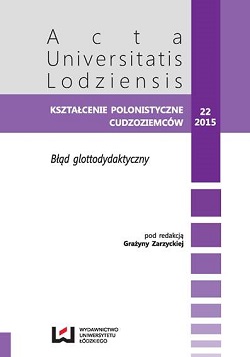Linguistic interference in formulating conditional constructions by Polish students who study Serbian as a foreign Language
DOI:
https://doi.org/10.18778/0860-6587.22.21Keywords:
Serbian as a foreign language, Polish language, linguistic interference, mistake in teaching language, conditional constructionsAbstract
The paper presents the analysis of the mistakes, which are made during the process of formulating the conditional constructions in Serbian language by students of the Slavic Studies in the University of Lodz, who learn Serbian as a foreign language. In addition, the author examines the issue of linguistic interference in formulating the conditional constructions in Serbian as a foreign language. The basis for the investigation is the corpus, containing various kinds of essays and tests which were collected during 6 years of teaching Serbian as a foreign language (Serbian in use) in all levels as long as diverse exercises, intentionally created for the research. Due to the fact that conditional constructions in Polish and in Serbian – despite many similarities – differ from each other and that in Serbian language there is one more syntactic (but not semantic) type of conditional construction, this constructions are very problematic for students, who very often make of the mistakes and moreover those mistakes lead to other ones. The aim of the research is to present all types of conditional constructions in both languages, to compare them and to demonstrate mistakes, made by students as a result of linguistic interference. Another goal is to suggest ways to prevent mistakes in order to avoid or minimize them.
References
Ajdžanović M., Alanović M., Bjelaković I., Vojnović J., 2006, Naučimo srpski 2, Novi Sad.
Google Scholar
Bjelaković I., Vojnović J., 2004, Naučimo srpski 1, Novi Sad.
Google Scholar
Bartnicka B., Satkiewicz H., 2007, Gramatyka języka polskiego. Podręcznik dla cudzoziemców, Warszawa.
Google Scholar
Bednarska K., 2014, Rola transferu językowego w nauczaniu języka polskiego Słoweńców, Łódź.
Google Scholar
Dąbrowska, A., Pasieka, M. 2006, Błąd językowy – niedostatek kompetencji, luka w sprawności czy niewłaściwa strategia?, w: A. Seretny, E. Lipińska (red.), Sprawności przede wszystkim, Kraków, s. 15–35.
Google Scholar
Duškov M., Korytkowska A., Sawicka I., 2005, Język serbski dla początkujących. Część pierwsza, Toruń.
Google Scholar
Gramatyka współczesnego języka polskiego, Składnia, 1984, pod red. Z. Topolińskiej, Warszawa.
Google Scholar
Klajn I., 2006, Gramatika srpskog jezika za strance, Beograd.
Google Scholar
Kryżan-Stanojević B., 2001, Propozycja ćwiczeń z komentarzem gramatycznym dla chorwackich studentów polonistyki, w: R. Cudak, J. Tambor (red.), Inne optyki. Nowe programy, nowe metody, nowe technologie w nauczaniu kultury polskiej i języka polskiego jako obcego, Katowice, s. 385–392.
Google Scholar
Markowski A., 2009, Kultura języka polskiego. Teoria. Zagadnienia leksykalne, Warszawa.
Google Scholar
Milićević-Dobromirov N., Novković B., 2009, Učimo srpski 1, Beograd.
Google Scholar
Milićević-Dobromirov N., Novković B., 2011, Super srpski, Beograd.
Google Scholar
Mrazović P., Vukadinović Z., 1990, Gramatika srpskohrvatskog jezika za strance, Novi Sad.
Google Scholar
Nowakowska M., 2004, Wpływ niektórych interferencji językowych z zakresu składni języka polskiego na podłożu słowackim, w: A. Dąbrowska (red.), Wrocławska dyskusja o języku polskim jako obcym, Wrocław, s. 211–215.
Google Scholar
Partridge M., 1988, Serbo-Croat Practical Grammar and Reader, Beograd.
Google Scholar
Sawicka I., 2000, Ćwiczenia z gramatyki języka serbskiego/Vežbe iz gramatike srpskog jezika, Toruń.
Google Scholar
Stanojčić Ž., Popović Lj., 2000, Gramatika srpskoga jezika, Beograd.
Google Scholar
Wesołowska D., 1992, Interferencja międzyjęzykowa jako źródło błędów, w: S. Grabias (red.), Język polski jako język obcy, Lublin, s. 63–68.
Google Scholar
Downloads
Published
How to Cite
Issue
Section
License

This work is licensed under a Creative Commons Attribution-NonCommercial-NoDerivatives 4.0 International License.










